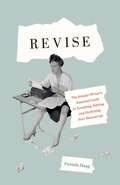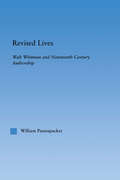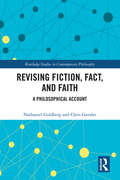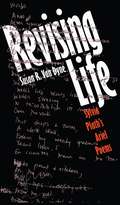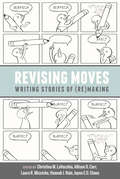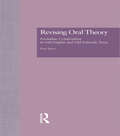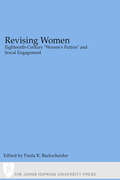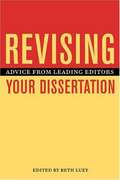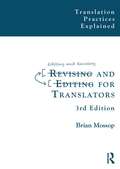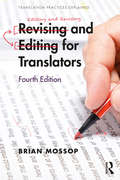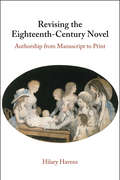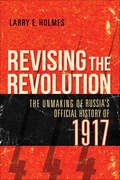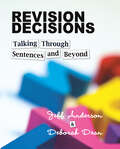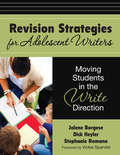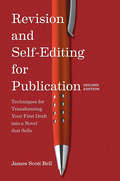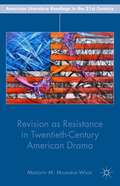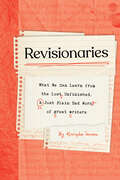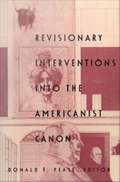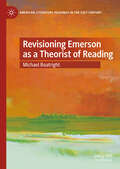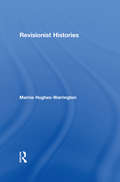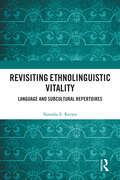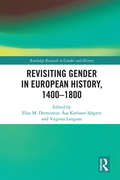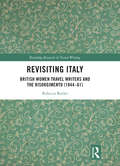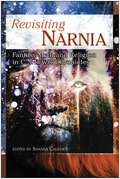- Table View
- List View
Revise: The Scholar-Writer’s Essential Guide to Tweaking, Editing, and Perfecting Your Manuscript
by Pamela HaagA helpful, engaging guide to the revision of scholarly writing by an editor and award-winning author &“Pamela Haag has been called &‘the tenure whisperer&’ for good reason. Any scholar who hopes to attract a wider audience of readers will benefit from the brilliant, step-by-step guidance shared here. It&’s pure gold for all aspiring nonfiction writers.&”—Nancy MacLean, author of Democracy in Chains: The Deep History of the Radical Right&’s Stealth Plan for America Writing and revision are two different skills. Many scholar-writers have learned something about how to write, but fewer know how to read and revise their own writing, spot editorial issues, and transform a draft from passable to great. Drawing on before and after examples from more than a decade as a developmental editor of scholarly works, Pamela Haag tackles the most common challenges of scholarly writing. This book is packed with practical, user-friendly advice and is written with warmth, humor, sympathy, and flair. With an inspiring passion for natural language, Haag demonstrates how to reconcile clarity with intellectual complexity. Designed to be an in-the-trenches desktop reference, this indispensable resource can help scholars develop a productive self-editing habit, advise their graduate and other students on style, and, ultimately, get their work published and praised.
Revised Lives: Whitman, Religion, and Constructions of Identity in Nineteenth-Century Anglo-American Culture (Literary Criticism and Cultural Theory)
by William PannapackerFirst published in 2004. Routledge is an imprint of Taylor & Francis, an informa company.
Revised New Oxford Modern English Coursebook 1 - ICSE
by David Horsburgh Nicholas Horsburgh Claire HorsburghThe Coursebooks offer lively and engaging reading passages for children, with a graded vocabulary. They include a diverse range of content such as new stories, factual accounts, contemporary fiction, and traditional folk stories. Each book incorporates drama and poetry, providing a comprehensive reading experience. The accompanying exercises reinforce learning by allowing active practice and catering to varying abilities. The workbook complements the Coursebooks by providing additional grammar drills and language skill practice. It also includes three tests, one for each school term, to assess the students' progress. Overall, the Coursebooks and Workbooks aim to develop reading, comprehension, language, listening, speaking, and writing skills in children.
Revising Fiction, Fact, and Faith: A Philosophical Account (Routledge Studies in Contemporary Philosophy)
by Chris Gavaler Nathaniel GoldbergThis book addresses how our revisionary practices account for relations between texts and how they are read. It offers an overarching philosophy of revision concerning works of fiction, fact, and faith, revealing unexpected insights about the philosophy of language, the metaphysics of fact and fiction, and the history and philosophy of science and religion. Using the novels of J.R.R. Tolkien as exemplars, the authors introduce a fundamental distinction between the purely physical and the linguistic aspects of texts. They then demonstrate how two competing theories of reference—descriptivism and referentialism—are instead constitutive of a single semantic account needed to explain all kinds of revision. The authors also propose their own metaphysical foundations of fiction and fact. The next part of the book brings the authors’ philosophy of revision into dialogue with Thomas Kuhn’s famous analysis of factual, and specifically scientific, change. It also discusses a complex episode in the history of paleontology, demonstrating how scientific and popular texts can diverge over time. Finally, the authors expand their philosophy of revision to religious texts, arguing that, rather than being distinct, such texts are always read as other kinds, that faith tends to be more important as evidence for religious texts than for others, and that the latter explains why religious communities tend to have remarkable historical longevity. Revising Fiction, Fact, and Faith offers a unique and comprehensive account of the philosophy of revision. It will be of interest to a wide range of scholars and advanced students working in philosophy of language, metaphysics, philosophy of literature, literary theory and criticism, and history and philosophy of science and religion.
Revising Life
by Susan R. Van Dyne'Provides a compelling argument for Plath's revision of the painful parts of her life--the failed marriage, her anxiety for success, and her ambivalence towards her mother. . . . The reader will feel the tension in the poetry and the life.'Choice '[Examines] Plath's twin goals of becoming a famous poet and a perfect mother. . . . This book's main points are clearly and forcefully argued: that both poems and babies require 'struggle, pain, endless labor, and . . . fears of monstrous offspring' and that, in the end, Plath ran out of the resources necessary to produce both. Often maligned as a self-indulgent confessional poet, Plath is here retrieved as a passionate theorist.'--Library Journal Susan Van Dyne's reading of twenty-five of Sylvia Plath's Ariel poems considers three contexts: Plath's journal entries from 1957 to 1959 (especially as they reveal her conflicts over what it meant to be a middle-class wife and mother and an aspiring writer in 1950s America); the interpretive strategies of feminist theory; and Plath's multiple revisions of the poems.
Revising Moves: Writing Stories of (Re)Making
by Hannah J. Rule Laura R. Micciche Christina M. LaVecchia Allison D. Carr Jayne E. O. StoneRevision sometimes seems more metaphor than real, having been variously described as a stage, an act of goal setting, a method of correction, a process of discovery, a form of resistance. Revising Moves makes a significant contribution to writing theory by collecting stories of revision that honor revision’s vitality and immerse readers in rooms, life circumstances, and scenes where revision comes to life. In these narrative-driven essays written by a wide range of writing professionals, Revising Moves describes revision as a messy, generative, and often collaborative act. These meditations reveal how revision is both a micro practice tracked by textual change and a macro phenomenon rooted in family life, institutional culture, identity commitments, and political and social upheaval. Contributors depict revision as a holistic undertaking and a radically contextualized, distributed practice that showcases its relationality to everything else. Authors share their revision processes when creating scholarly works, institutional and self-promoting documents, and creative projects. Through narrative the volume opens a window to what is often unseen in a finished text: months or years of work, life events that disrupt or alter writing plans, multiple draft changes, questions about writerly identity and positionality, layers of (sometimes contradictory) feedback, and much more.
Revising Oral Theory: Formulaic Composition in Old English and Old Icelandic Verse (Garland Studies in Medieval Literature #Vol. 16)
by Paul AckerFirst published in 1998. Routledge is an imprint of Taylor & Francis, an informa company.
Revising Women: Eighteenth-Century "Women's Fiction" and Social Engagement
by Paula R. BackscheiderRevising Women is a collection of essays by a distinguished group of feminist critics. Each essay is a contribution to the history of the English novel, to our understanding of literature's place in cultural debate, and to women's studies. The essays give steady attention to the ways novels participate in social processes and the ways women perceived the public sphere and stubbornly attempted to participate in it. Rich contextualization and adept use of theory reveal both the individual writer's story and the story beneath the text that is a cultural production with the potential to reveal why we and our society are as we are. Each essay develops ways of using history in relation to literature, takes up large historical events and issues, and interprets in fine detail what individuals do with them. Beginning with the fictions of the late seventeenth century, and ending with Maria Edgeworth and Jane Austen, the essays in Revising Women are characterized by informed historicizing, detailed textual explication, sophisticated feminist theory, and dedicated attention to the interrelationships between life and literary works and between everyday existence and political processes.
Revising Your Dissertation: Advice from Leading Editors
by Beth LueyThis lively guide offers practical advice on turning a Ph.D. dissertation into a book or into journal articles that will appeal to publishers and readers.
Revising and Editing for Translators: Revising And Editing For Translators (Translation Practices Explained)
by Brian MossopRevising and Editing for Translators provides guidance and learning materials for translation students learning to edit texts written by others, and professional translators wishing to improve their self-revision ability or learning to revise the work of others. Editing is understood as making corrections and improvements to texts, with particular attention to tailoring them to the given readership. Revising is this same task applied to draft translations. The linguistic work of editors and revisers is related to the professional situations in which they work. Mossop offers in-depth coverage of a wide range of topics, including copyediting, style editing, structural editing, checking for consistency, revising procedures and principles, and translation quality assessment. This third edition provides extended coverage of computer aids for revisers, and of the different degrees of revision suited to different texts. The inclusion of suggested activities and exercises, numerous real-world examples, a proposed grading scheme for editing assignments, and a reference glossary make this an indispensable coursebook for professional translation programmes.
Revising and Editing for Translators: Revising And Editing For Translators (Translation Practices Explained)
by Brian MossopRevising and Editing for Translators provides guidance and learning materials for translation students and professional translators learning to revise the work of others or edit original writing, and those wishing to improve their self-revision ability. Revising and editing are seen as reading skills aimed at spotting problematic passages. Changes are then made to meet some standard of quality that varies with the text and to tailor the text to its readership. Mossop offers in-depth coverage of a wide range of topics, including copyediting, stylistic editing, checking for consistency, revising procedures and principles, and translation quality assessment—all related to the professional situations in which revisers and editors work. This revised fourth edition provides new chapters on revising machine outputs and news trans-editing, a new section on reviser competencies, and a completely new grading scheme for assignments. The inclusion of suggested activities and exercises, numerous real-world examples, and a reference glossary make this an indispensable coursebook for professional translation programmes.
Revising the Eighteenth-Century Novel: Authorship from Manuscript to Print
by Hilary HavensRevisions form a natural part of the writing process, but is the concept of revision actually an intrinsic part of the formation of the novel genre? Through the recovery and analysis of material from novel manuscripts and post-publication revisions, Hilary Havens identifies a form of 'networked authorship'. By tracing authors' revisions to their novels, the influence of familial and literary circles, reviewers, and authors' own previous writings can be discerned. Havens focuses on the work of Samuel Richardson, Frances Burney, Jane Austen, and Maria Edgeworth to challenge the individualistic view of authorship that arose during the Romantic period, and argues that networked authorship shaped the composition of eighteenth-century novels. Exploring these themes of collaboration and social networks, as well as engaging with the burgeoning trend towards textual recovery, this work is an important contribution in the study of eighteenth-century novels and their manuscript counterparts.
Revising the Revolution: The Unmaking of Russia's Official History of 1917
by Larry E. HolmesThe clash between scholarship and politics—between truth and propaganda—was ruthless for historians in Istpart, the Russian Communist Central Committee's official historical department.Istpart was tasked with preserving the documentary record, compiling memoirs, and upholding ideological conformism within the national narrative of the 1917 revolution. In Revising the Revolution, Larry E. Holmes examines the role of Istpart's historians, in both the Moscow office and a regional branch in Viatka, who initially believed they could adhere to the traditional standards of research and simultaneously provide a history useful to the party. However, they quickly realized that the party rejected any version of history that suggested nonideological or nonpolitical sources of truth. By 1928, Istpart had largely abandoned its mission to promote scholarly work on the 1917 revolution and instead advanced the party's master narrative. Revising the Revolution explores the battle for the Russian national narrative and the ways in which history can be used to centralize power.
Revision Decisions: Talking Through Sentences and Beyond
by Jeff Anderson Deborah DeanRevision is often a confusing and difficult process for students, but it's also the most important part of the writing process. If students leave our classrooms not knowing how to move a piece of writing forward, we've failed them. Revision Decisions: Talking Through Sentences and Beyond will help teachers develop the skills students need in an ever-evolving writing, language, and reading world. Jeff Anderson and Deborah Dean have written a book that engages writers in the tinkering, playing, and thinking that are essential to clarify and elevate writing. Focusing on sentences, the authors use mentor texts to show the myriad possibilities that exist for revision. Essential to their process is the concept of classroom talk. Readers will be shown how revision lessons can be discussed in a generative way, and how each student can benefit from talking through the revision process as a group. Revision Decisions focuses on developing both the writing and the writer. The easy-to-follow lessons make clear and accessible the rigorous thinking and the challenging process of making writing work. Narratives, setup lessons, templates, and details about how to move students toward independence round out this essential book. Additionally, the authors weave the language, reading, and writing goals of the Common Core and other standards into an integrated and connected practice. The noted language arts teacher James Britton once said that good writing floats on a sea of talk. Revision Decisions supports those genuine conversations we naturally have as readers and writers, leading the way to the essential goal of making meaning.
Revision Strategies for Adolescent Writers: Moving Students in the Write Direction
by Jolene A. Borgese Richard E. Heyler Stephanie A. RomanoSupported by the Common Core State Standards, the 30+ strategies in this book include pre-writing planning, peer conferencing, modeling effective revision, and using technology.
Revision and Self Editing for Publication: Techniques for Transforming Your First Draft into a Novel that Sells
by James Scott BellTake your first draft from so-so to sold! You've finished the first draft of your novel--congratulations! Time to have a drink, sit back...and start revising. But the revision process doesn't have to be intimidating. Revision and Self-Editing for Publication, Second Edition gives you the tools and advice you need to transform your first draft into a finished manuscript that agents and editors will fight for. Inside you'll find: Self-editing techniques for plot, structure, character, theme, voice, and more that can be applied as you're writing to reduce your revision workload. Methods for fine-tuning your first draft into a tight, well-developed piece of literature. The Ultimate Revision Checklist, which seamlessly guides you through the revision process, step by step. New Chapter! Exercises and techniques for "deepening" your work to engage and excite readers like never before. Whether you're writing a novel currently or have finished the first draft, Revision and Self-Editing for Publication, Second Edition will give you the guidance you need to revise your manuscript into a novel ready to be sold.
Revision as Resistance in Twentieth-Century American Drama
by Meredith M. Malburne-WadeAmerican dramas consciously rewrite the past as a means of determined criticism and intentional resistance. While modern criticism often sees the act of revision as derivative, Malburne-Wade uses Victor Turner's concept of the social drama and the concept of the liminal to argue for a more complicated view of revision.
Revisionaries: What We Can Learn from the Lost, Unfinished, and Just Plain Bad Work of Great Writers
by Kristopher JansmaFind creative inspiration in this fascinating rummage through the wastebaskets, secret diaries, and abandoned files of 20 literary superstars.If you like to write—whether it&’s a pastime, a passion, or a profession—you&’ve probably found yourself reading something brilliant and thinking, &“I could never do this! I might as well give up.&” But if there&’s one thing every great author has in common, it&’s this: they&’ve all written some hot garbage. In Revisionaries, a writing expert takes you on an engrossing tour through the discarded drafts, false starts, and abandoned projects of influential writers. In the process, he dismantles some of our most deeply held—and most suffocating—ideas about what it takes to produce great creative work. You&’ll learn that: Franz Kafka lacked confidenceOctavia Butler had writer's block F. Scott Fitzgerald wrote bad draftsRalph Ellison got overwhelmedLouisa May Alcott got off to a bad startAnd more deep, dark secrets about the authors you most admireWritten by an award-winning novelist and creative-writing professor, Revisionaries is a compelling peek behind the scenes of genius for writers and readers alike.
Revisionary Interventions into the Americanist Canon
by Donald E. PeaseThroughout the era of the Cold War a consensus reigned as to what constituted the great works of American literature. Yet as scholars have increasingly shown, and as this volume unmistakably demonstrates, that consensus was built upon the repression of the voices and historical contexts of subordinated social groups as well as literary works themselves, works both outside and within the traditional canon. This book is an effort to recover those lost voices. Engaging New Historicist, neo-Marxist, poststructuralist, and other literary practices, this volume marks important shifts in the organizing principles and self-understanding of the field of American Studies. Originally published as a special issue of boundary 2, the essays gathered here discuss writers as diverse as Kate Chopin, Frederick Douglass, Emerson, Melville, W. D. Howells, Henry James, W. E. B. DuBois, and Mark Twain, plus the historical figure John Brown. Two major sections devoted to the theory of romance and to cultural-historical analyses emphasize the political perspective of "New Americanist" literary and cultural study. Contributors. William E. Cain, Wai-chee Dimock, Howard Horwitz, Gregory S. Jay, Steven Mailloux, John McWilliams, Susan Mizruchi, Donald E. Pease, Ivy Schweitzer, Priscilla Wald, Michael Warner, Robert Weimann
Revisioning Emerson as a Theorist of Reading (American Literature Readings in the 21st Century)
by Michael BoatrightPushing beyond the anthologized writings of Ralph Waldo Emerson frequently taught in American literature courses, this book examines the corpus of his published work to cultivate a unique understanding of his ideas in relation to reading. By following the history of Emersonian criticism over the years, including research surrounding Emerson and reading theory, these chapters provide a persuasive and accessible exploration of Emerson that highlight the value of his work for both literary and reading scholars. Boatright argues that while Emerson predates the research in reading studies that emerged in the early twentieth century, his ideas around reading engagement, shared reading experiences, and experimentation with reading are exceedingly relevant for encouraging healthy reading practices in the literature classroom.
Revisionist Histories
by Marnie Hughes-WarringtonRevision and revisionism are generally seen as standard parts of historical practice, yet they are underexplored within the growing literature on historiography. In this accessibly written volume, Marnie Hughes-Warrington discusses this paucity of work on revision in history theory and raises ethical questions about linear models and spatial metaphors that have been used to explain it. Revisionist Histories emphasises the role of the authors and audiences of histories alike as the writers and rewriters of history. Through study of digital environments, graphic novels and reader annotated texts, this book shows that the ‘sides’ of history cannot be disentangled from one another, and that they are subject to flux and even destruction over time. Incorporating diverse and controversial case studies, including the French Revolution, Holocaust Denial and European settlers’ contact with Native Americans and Indigenous Australians, Revisionist Histories offers both a detailed account of the development of revisionism and a new, more spatial vision of historiography. An essential text for students of historiography.
Revisiting Ethnolinguistic Vitality: Language and Subcultural Repertoires
by Natasha E. RavyseThis book examines traditional theories of linguistic vitality in the context of subcultural languages. It argues that traditional methods of investigating linguistic vitality are, according to existing literature, not as reliable as they appear and therefore limited in their testability. The author looks at themes such as the relationships between language and culture, ethnicity within the scope of sociolinguistics, and the notion of ideolinguistic vitality where traditional views intersect with more contextually current ones. She also highlights the importance of studying the nature and principles of subcultural languages which help better inform our understanding of the superdiverse linguistic world. The volume makes a major contribution to modern sociolinguistics by offering a detailed account of developing a unique measuring instrument to gauge the vitality of subcultural languages, which is applicable to more than just subcultural linguistics. An indispensable text in the study of ethnolinguistic vitality, the book will be of interest to students and researchers of sociolinguistics, applied linguistics, identity theory, philology, language and literature, cultural studies, and postcolonial studies.
Revisiting Gender in European History, 1400–1800 (Routledge Research in Gender and History #31)
by Virginia Langum Elise M. Dermineur Åsa Karlsson SjögrenDo women have a history? Did women have a renaissance? These were provocative questions when they were raised in the heyday of women’s studies in the 1970s. But how relevant does gender remain to premodern history in the twenty-first century? This book considers this question in eight new case studies that span the European continent from 1400 to 1800. An introductory essay examines the category of gender in historiography and specifically within premodern historiography, as well as the issue of source material for historians of the period. The eight individual essays seek to examine gender in relation to emerging fields and theoretical considerations, as well as how premodern history contributes to traditional concepts and theories within women’s and gender studies, such as patriarchy.
Revisiting Italy: British Women Travel Writers and the Risorgimento (1844–61) (Routledge Research in Travel Writing)
by Rebecca ButlerWith the rise of mass tourism, Italy became increasingly accessible to Victorian women travellers not only as a locus of artistic culture but also as a site of political enquiry. Despite being outwardly denied a political voice in Britain, many female tourists were conspicuous in their commitment to the Italian campaign for national independence, or Risorgimento (1815–61). Revisiting Italy brings several previously unexamined travel accounts by women to light during a decisive period in this political campaign. Revealing the wider currency of the Risorgimento in British literature, Butler situates once-popular but now-marginalized writers: Clotilda Stisted, Janet Robertson, Mary Pasqualino, Selina Bunbury, Margaret Dunbar and Frances Minto Elliot alongside more prominent figures: the Shelley-Byron circle, the Brownings, Florence Nightingale and the Kemble sisters. Going beyond the travel book, she analyses a variety of forms of travel writing including unpublished letters, privately printed accounts and periodical serials. Revisiting Italy focuses on the convergence of political advocacy, gender ideologies, national identity and literary authority in women’s travel writing. Whether promoting nationalism through a maternal lens, politicizing the pilgrimage motif or reviving gothic representations of a revolutionary Italy, it identifies shared touristic discourses as temporally contingent, shaped by commercial pressures and the volatile political climate at home and abroad.
Revisiting Narnia: Fantasy, Myth And Religion in C. S. Lewis' Chronicles
by Shanna CaugheyTheologians, psychologists, academics, feminists, and fantasists offer humor, insight, and fresh perspectives on the enchanting and beloved Chronicles of Narnia series. Such contributors as fantasists Sarah Zettel and Lawrence Watt-Evans, children's literature scholar Naomi Wood, and C.S. Lewis scholars Colin Duriez and Joseph Pearce discuss topics such as J.R.R. Tolkien and Middle Earth's influence on the conception of Narnia, the relevance of allegory for both Christians and non-Christians, the idea of divine providence in Narnia, and Narnia's influence on modern-day witchcraft. Fans of the wildly popular series will revel in the examination of all aspects of C.S. Lewis and his magical Narnia.
